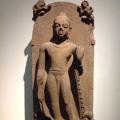46. No Four Ways About It: Nāgārjuna’s Tetralemma
Nāgārjuna’s four-fold argument scheme, the tetralemma (catuṣkoṭi).
Themes:
• V. Bharadwaja, “Rationality, Argumentation and Philosophical Embarrassment: a Study of Four Logical Alternatives (Catuṣkoṭi) in Buddhist Logic,” Philosophy East and West 34 (1984), 303–19.
• B. Galloway, “Some Logical Issues in Madhyamaka Thought,” Journal of Indian Philosophy 17 (1989), 1–35.
• K.N. Jayatilleke, “The Logic of Four Alternatives,” Philosophy East and West 17 (1967), 69–83.
• R. Robinson, “Some Logical Aspects of Nāgārjuna’s System,” Philosophy East and West 6 (1957), 291–308.
• D.S. Ruegg, “The Uses of The Four Positions of the Catuṣkoṭi and The Problem of The Description of Reality in Mahāyāna Buddhism,” Journal of Indian Philosophy 5 (1977), 1–71.
• T.E. Wood, Nāgārjunian Disputations (Honolulu: 1994).







Comments
Graham Priest
Hi Peter,
I gathered from this episode that you and Jonardon hold the dialetheist interpretation of the tetralemma in pretty low regard. Nevertheless, you've stated that Graham Priest will be appearing on the podcast. He is, as far as I'm aware, arguably the main exponent of that view, even saying that dialetheism is more common in eastern than western philosophy (albeit without linking that to mysticism). Will this issue come up on the podcast? It'd be interesting to hear him defend his interpretation after it got such short shrift in this episode.
In reply to Graham Priest by Jack
Priest
Yes, actually that was one reason we wanted to have him on - so that he could give his side of the debate. Quite a lot of that interview will be about dialethism, in fact the whole thing is a discussion of how his interest in non-classical logic relates to his interest in Buddhism.
In reply to Priest by Peter Adamson
Great, looking forward to it!
Great, looking forward to it!
Motion
First, let me start by stating that I really enjoy your podcast. Althought it took me a while to catch up, I have listened to most of the series twice, and have been buying the books. I think you are doing a tremendous job, and a great service to your field.
As a mathematical physicist, I must take contention with the claim in this podcast that using mathematics, as opposed to "natural language", doesn't solve problems such as, "at what time does an arrow start moving?" It does. I've alwaays felt that for a physicist, mathematics is the best language for expressing logical thought. The mathematical concepts of calculus, such as "sets of measure zero", infinitisimals, infinite sums, and the like, really do solve the paradoxes involved. Using mathematicsk makes it relatively easy to find errors in logic, experiment lets you know that your suppositions have something to do with reality. On a similar note, I do think Aristotle did intuitively understand infinities well enough to solve Zeno's related paradox. (I even read in Scientific American that Aristotle proposed measuring the angles of a triangle to see if what we know of as Euclid's 5th postulate is actually correct.)
In reply to Motion by Tim Allison
Mathematics and motion
Hi, sorry not to respond to this earlier - I didn't notice the comment go up. Clearly you are right that mathematics is useful for modeling physical phenomena - like, I wouldn't want to get on a plane that hadn't been designed using math! However I think the paradoxes go deep enough that it is not enough simply to offer a mathematical model for the phenomena in question. This is in fact particularly clear with the arrow, since really this paradox is about time and how motion at a time is related to motion over time. Pretty obviously, mathematics cannot just reveal the nature of time: this is an empirical and metaphysical question, and alternative views of time would probably get different mathematical models. So, math can bring clarity to these issues but not, I think, solutions to the paradoxes of Zeno or Nagarjuna.
There were many words and
There were many words and names(both Sanskrit and Polish!) mentioned in this episode that were hard to spell from listening to them. Could you please provide show notes with the episodes with the names spelled out!
In reply to There were many words and by Shashvat Shukla
Terminology
Yes, this is always an issue - maybe especially in this series on India since as other listeners have pointed out my pronunciation of Sanskrit is unsurprisingly rubbish. Providing lists of all the words would be a lot of work but if you just hang on for a bit all these scripts will appear in book form and then of course you can see the spellings. But if there is something in particular you wanted to know about just ask and I will let you know what the term is.
Rigveda
I don't whether you know it or not but the rigvedic saves actually tried to apply the 3rd and 4th option of nagarjuna's tetralemma (or may be simply trying to use the very same method) on the question of creation in the very famous creation hymm of nasadiya sukta
Zeno
The point Zeno made is that objects have infinite parts. Aristotle in essence responded that they only potentially have parts, which I think is far to say is a meaningless observation. The argument against the arrow argument is that time is dependent on motion. If all the time along a line was zeroes you could never get anywhere. However, the motion is prior to time. They work together but time doesn't exist without motion. Motion contains all the infinite "parts" of time and since it's all infinite in a certain respect motion can happen
In reply to Zeno by Gregory Rossi
Infinite parts
I don't think it's meaningless for Aristotle to say that the "parts" of an extension are only potential. To the contrary, it is even common sense. I mean, usually when we talk about the parts of something, like a car, we are talking about actual parts (the engine, or a wheel), not arbitrary divisions (the left 37% of the car). When you make such an arbitrary division, you are effectively making something that was not "really" there to be there, like when you mark off a racetrack with chalk at every meter. So what he's saying is that you can divide a distance however you like, e.g. into meters, and then you will naturally divide the time in the same way; but surely the burden of proof is on Zeno to show that the distance must be divided into an infinite number of parts so that the motion needs infinite time. Doesn't that make sense?
Add new comment